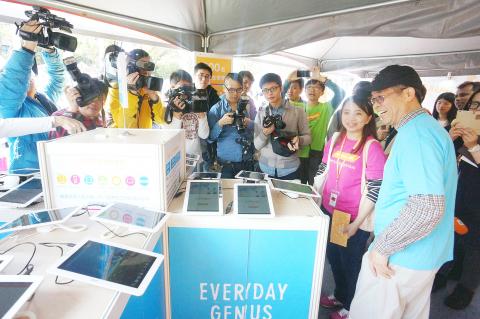MediaTek Inc (聯發科), which designs chips used in smartphones from major Chinese brands including Xiaomi Corp (小米) and Lenovo Group (聯想), yesterday launched a global recruitment program to hire 2,000 new employees to cope with the company’s rapidly growing businesses.
MediaTek launched the program at a jobs fair held by National Taiwan University in Taipei yesterday. The program is part of the company’s broader efforts to boost its research and development capabilities to prepare for intensifying competition.
“MediaTek has 10,000 employees working in 27 locations in 12 countries. They work in different divisions, including marketing, research and development and customer services,” MediaTek chairman Tsai Ming-Kai (蔡明介) said during a speech at the jobs fair.

Photo: CNA
“MediaTek offers an environment for employees to learn and grow with world-class talents,” Tsai said.
To support the company’s strong growth this year and in the longer term, MediaTek plans to boost research and development spending by 20 percent annually this year, as it foresees a need to develop advanced patents for 4G long-term evolution (LTE) technology, the firm said.
MediaTek allocated 20.3 percent of its total revenue for research and development last year, according to statistics released two weeks ago by IC Insights Inc.
Meanwhile, MediaTek aims to double its LTE market share in China to 40 percent this year, taking on larger rival Qualcomm Inc.
“This year will be another year of investment for MediaTek. We will significantly expand research and development resources to accelerate development of new products and new technologies,” company president Hsieh Ching-jiang (謝清江) told investors last month.
“We hope to recruit top talent from around the world to broaden our product lines. We also plan to invest on advanced processor manufacturing and cutting-edge technologies,” Hsieh said.
MediaTek is broadening its smartphone chip lineup and expanding into new areas, including chips for wearable devices.
With new products in the pipeline and fast-growing LTE chip demand from China, the company aims to grow its revenue by 10 to 20 percent this year from a record-high of NT$213.06 billion (US$6.74 billion) last year.
To entice high-quality potential candidates, MediaTek is offering salaries starting at NT$1 million per year for new employees with a master’s degree, and those who have earned their doctorate would receive at least NT$1.5 million per year, the company said. The offerings do not include annual employee bonuses or any other compensation.
The Hsinchu-based company yesterday also launched an internship program for 200 college students from Taiwan and overseas to work as apprentices at MediaTek during the summer vacation.

SEMICONDUCTORS: The German laser and plasma generator company will expand its local services as its specialized offerings support Taiwan’s semiconductor industries Trumpf SE + Co KG, a global leader in supplying laser technology and plasma generators used in chip production, is expanding its investments in Taiwan in an effort to deeply integrate into the global semiconductor supply chain in the pursuit of growth. The company, headquartered in Ditzingen, Germany, has invested significantly in a newly inaugurated regional technical center for plasma generators in Taoyuan, its latest expansion in Taiwan after being engaged in various industries for more than 25 years. The center, the first of its kind Trumpf built outside Germany, aims to serve customers from Taiwan, Japan, Southeast Asia and South Korea,

POWERING UP: PSUs for AI servers made up about 50% of Delta’s total server PSU revenue during the first three quarters of last year, the company said Power supply and electronic components maker Delta Electronics Inc (台達電) reported record-high revenue of NT$161.61 billion (US$5.11 billion) for last quarter and said it remains positive about this quarter. Last quarter’s figure was up 7.6 percent from the previous quarter and 41.51 percent higher than a year earlier, and largely in line with Yuanta Securities Investment Consulting Co’s (元大投顧) forecast of NT$160 billion. Delta’s annual revenue last year rose 31.76 percent year-on-year to NT$554.89 billion, also a record high for the company. Its strong performance reflected continued demand for high-performance power solutions and advanced liquid-cooling products used in artificial intelligence (AI) data centers,

Gasoline and diesel prices at domestic fuel stations are to fall NT$0.2 per liter this week, down for a second consecutive week, CPC Corp, Taiwan (台灣中油) and Formosa Petrochemical Corp (台塑石化) announced yesterday. Effective today, gasoline prices at CPC and Formosa stations are to drop to NT$26.4, NT$27.9 and NT$29.9 per liter for 92, 95 and 98-octane unleaded gasoline respectively, the companies said in separate statements. The price of premium diesel is to fall to NT$24.8 per liter at CPC stations and NT$24.6 at Formosa pumps, they said. The price adjustments came even as international crude oil prices rose last week, as traders

SIZE MATTERS: TSMC started phasing out 8-inch wafer production last year, while Samsung is more aggressively retiring 8-inch capacity, TrendForce said Chipmakers are expected to raise prices of 8-inch wafers by up to 20 percent this year on concern over supply constraints as major contract chipmakers Taiwan Semiconductor Manufacturing Co (TSMC, 台積電) and Samsung Electronics Co gradually retire less advanced wafer capacity, TrendForce Corp (集邦科技) said yesterday. It is the first significant across-the-board price hike since a global semiconductor correction in 2023, the Taipei-based market researcher said in a report. Global 8-inch wafer capacity slid 0.3 percent year-on-year last year, although 8-inch wafer prices still hovered at relatively stable levels throughout the year, TrendForce said. The downward trend is expected to continue this year,